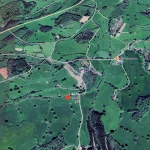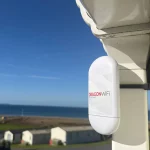BT Makes its 80Mbps Superfast FTTC Broadband Upgrade Available to ISPs
BTOpenreach, which is responsible for providing UK internet providers with equal access to BT’s telecoms infrastructure, is this week expected to make its ‘up to’ 80Mbps (download speed) upgrade available to all ISPs offering services via their superfast broadband Fibre-to-the-Cabinet (FTTC) platform (the 80Mbps trial ends today). FTTC’s maximum upload speed will also rise up to 20Mbps.
FTTC itself works by delivering a fast fibre optic cable to BT’s street level cabinets, while the remaining connection (between cabinets and homes) is done using VDSL2 over existing copper cable. This method is similar to current ‘up to’ 20-24Mbps ADSL2+ broadband but faster over short distances.
At present most FTTC based broadband packages, such as the BT-Infinity service, offer download speeds of up to 40Mbps (Megabits per second) and uploads of up to 10Mbps. Happily BT has been able to double this simply by increasing the technology’s spectrum allocation (from 7MHz to 17MHz) under the Access Network Frequency Plan (ANFP).
The service is currently available to more than 8 million UK homes and businesses, which should rise to 10 million premises (40% of the UK) by the end of this year. Officially BT’s rollout takes its FTTC reach to 66% of the UK by 2014 but it could eventually reach 90% (2015-2017); provided BT wins a lion’s share of public funding from the governments Broadband Delivery UK (BDUK) office.
Advertisement
Mike Galvin, Openreach MD of Network Investment, said:
“It is now up to broadband providers to decide how and when they offer these faster speeds to their customers. The platform is there and we are confident there will be demand for these enhanced services.”
It’s important to point out that FTTC is still a distance dependent technology, which means that it can get significantly slower the further away you are from your local street cabinet (not telephone exchange). BT states that an end user may cease their FTTC service within 90 days of installation if the “line does not achieve at least 50% of the speed predicted at the point of sale“. Interestingly BT says it will not accept FTTC orders if the line cannot handle at least 2Mbps+.
BTOpenreachs Statement to ISPs
There is no speed limitation for you to consider when placing an order for any of the GEA over FTTC product variants. You may order any product variant on any line that has a predicted speed of 2Mbit/s or more downstream, and 128kbit/s or more, upstream. GEA over FTTC is not available on lines predicted to receive less than 2Mbit/s downstream.
Customers who already take an ‘up to’ 40Mbps package should not expect a free upgrade, although it is possible that some ISPs might be able to do this. Many ISPs, mindful of the higher potential data usage and costs incurred by the service, will offer the new speed as part of a premium package or optional upgrade.
Happily no new work is required at the customers end to upgrade from 40Mbps to 80Mbps, although you should make sure that your existing router and WiFi connectivity can cope with the new speeds before adopting a related package (wifi connections in particular could struggle).
We expect several ISPs to announced 80Mbps packages over the coming weeks and months, although TalkTalk has already revealed that its 80Mbps upgrade will cost +£15 extra per month (here); TalkTalk’s current 40Mbps service costs +£10 extra. AAISP also plans to charge a similar amount (here) and you can bet that BT Retail, Zen Internet and PlusNet will soon join the club. A few others like Aquiss, which plan to charge an extra +£6 inc. VAT for the new speed from 12th April 2012, have also announced their prices.
Advertisement
It will be interesting to see how many consumers would be willing to pay the extra for a 40Mbps to 80Mbps upgrade. People who can already benefit from close to the full speed might find little reason to upgrade (not many online services can take advantage of speeds over 40Mbps), while others will live too far from their street cabinet to get above 40Mbps in the first place.
Mark is a professional technology writer, IT consultant and computer engineer from Dorset (England), he also founded ISPreview in 1999 and enjoys analysing the latest telecoms and broadband developments. Find me on X (Twitter), Mastodon, Facebook, BlueSky, Threads.net and Linkedin.
« Virgin Media Business Warns of Bottomless Pit for Mobile Data Use

















































Comments are closed